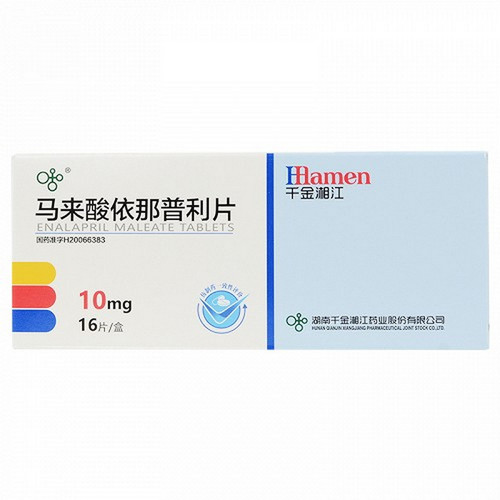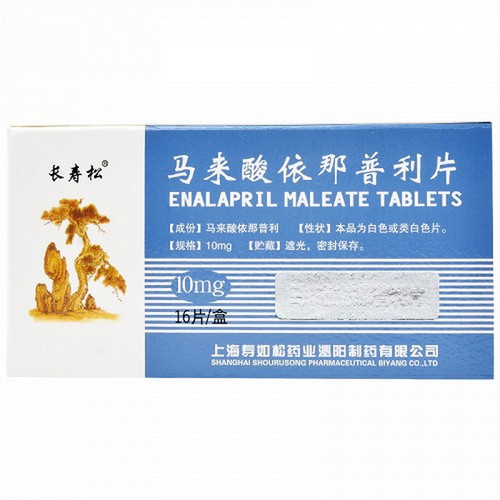Product Overview
[Drug Name]
Generic Name: Enalapril Maleate and Folic Acid Tablets
Trade Name: Yiye
English Name: Enalapril Maleate and Folic Acid Tablets
Chinese Pinyin: Enalapril Maleate and Folic Acid Tablets
[Ingredients]
This product is a combination preparation consisting of varying doses of enalapril maleate and folic acid.
[Appearance]
This product is yellow or light yellow tablets.
[Indications]
It is used to treat essential hypertension associated with elevated plasma homocysteine levels. Enalapril maleate lowers blood pressure in hypertensive patients, and folic acid can lower plasma homocysteine levels. Whether lowering plasma homocysteine levels can prevent cardiovascular and cerebrovascular events is unclear.
[Dosage and Administration]
Different strengths of enalapril maleate and folic acid tablets are available depending on blood pressure control. The recommended starting dose is 5 mg/0.4 mg daily. The dose can be adjusted based on the patient's response or as directed by a physician. Patients with abnormal liver and kidney function and elderly patients should reduce the dosage as appropriate or follow a physician's advice.
[Adverse Reactions]
In clinical trials, adverse reactions associated with enalapril maleate and folic acid tablets were similar to those associated with enalapril maleate alone, primarily cough, headache, dry mouth, fatigue, upper abdominal discomfort, nausea, palpitations, and rash. Most adverse reactions were mild and transient and did not require discontinuation of treatment.
[Contraindications]
This product is contraindicated in patients with allergies.
[Precautions]
1. The homocysteine-lowering effect of folic acid is significantly affected by the C677T polymorphism in the methylenetetrahydrofolate reductase (MTHFR) gene. Patients with the homozygous mutant (TT genotype) experience greater efficacy with enalapril maleate and folic acid tablets. 2. This product can be used in combination with other antihypertensive drugs, especially diuretics, to significantly enhance its antihypertensive effect. However, it should not be used in combination with potassium-sparing diuretics. 3. In some patients, particularly those taking diuretics or experiencing hypovolemia, this product may cause an excessive decrease in blood pressure. Therefore, the first dose should be started at a low dose, or as directed by a physician. 4. Regularly perform white blood cell counts and renal function tests. 5. Do not use this product if its properties change. 6. Keep this product out of reach of children.
[Special Population Use]
Precautions for Children:
The safety of this product in patients under 18 years of age has not been verified; use with caution in children.
Precautions for Pregnancy and Lactation:
1. This drug is not recommended during pregnancy. If pregnancy is confirmed, discontinue use of this product immediately unless it is absolutely necessary to save the mother's life. Use of ACE inhibitors during the second and third trimesters of pregnancy can cause fetal and neonatal morbidity and mortality. Use of ACE inhibitors during this period has been associated with various fetal and neonatal injuries (including hypotension, renal failure, hyperkalemia, and/or incomplete cranial development). Oligohydramnios (presumably a sign of reduced fetal renal function) has occurred and can lead to limb spasticity, craniofacial malformations, and pulmonary hypoplasia. If patients use this drug, they should be informed of the potential risk to the fetus. Use during the first trimester of pregnancy exposes the uterus to this angiotensin-converting enzyme.
[Precautions for Elderly Patients]
Elderly patients should reduce the dosage as appropriate or take the drug as directed by their physician.
[Drug Interactions]
1. Antihypertensive Therapy: This drug may have additive effects when used concomitantly with other antihypertensive drugs, especially diuretics. Carefully monitor the patient's condition when using this drug with ganglionic blockers or adrenergic receptor blockers. There are no clinically significant interactions between enalapril maleate and the following drugs: furosemide, digoxin, timolol, warfarin, indomethacin, and sulindac. Coadministration of propranolol with enalapril maleate may decrease enalapril serum concentrations, but this is not clinically significant. In animal studies, no interaction between cimetidine and enalapril maleate was observed. 2. Serum Potassium: In clinical trials, serum potassium generally remained within the normal range. After 48 weeks of monotherapy in hypertensive patients, serum potassium increased by an average of approximately 1.2 mEq/L. Concomitant use of enalapril maleate can mitigate the decrease in serum potassium caused by thiazide diuretics. Risk factors for hyperkalemia include renal insufficiency, diabetes, and concomitant use of potassium-sparing diuretics (such as spironolactone, triamterene, or amiloride), potassium supplements, or potassium-containing salt substitutes. Taking enalapril maleate in these situations can cause a significant increase in serum potassium. If concomitant use of these agents is considered appropriate, use with caution and monitor serum potassium frequently. 3. Serum Lithium: Like other sodium-excreting agents, enalapril maleate may reduce lithium clearance. Therefore, as with lithium, serum lithium concentrations should be monitored carefully. 4. Nonsteroidal Anti-inflammatory Drugs: In some patients with renal insufficiency, the concomitant use of angiotensin-converting enzyme inhibitors and nonsteroidal anti-inflammatory drugs may further impair renal function; this effect is generally reversible. Folic Acid: 1. High-dose folic acid can antagonize the antiepileptic effects of phenobarbital, phenytoin, and primidone, significantly lowering the threshold for epileptic seizures and increasing the frequency of seizures in susceptible patients. 2. Oral administration of high-dose folic acid can impair the absorption of the trace element zinc. 3. Concomitant use with other medications may result in drug interactions. Please consult your physician or pharmacist for details.
[Pharmacological Actions]
Enalapril maleate is a second-generation angiotensin-converting enzyme inhibitor. After oral administration, it is rapidly and completely hydrolyzed in the body to enalaprilat. Enalaprilat lowers blood pressure primarily by inhibiting the renin-angiotensin-aldosterone system, which plays a key role in blood pressure regulation. Folic acid is essential for cell growth and reproduction. Folic acid is converted to tetrahydrofolate (THFA) by the action of dihydrofolate reductase and vitamin B12. THFA combines with various one-carbon units to form tetrahydrofolate coenzymes, which transfer one-carbon units and participate in many important reactions in the body and in the synthesis of nucleic acids and amino acids. Folic acid acts on the methionine cycle. Its one-carbon unit is converted to a methyl group, which can remethylate homocysteine, generating methionine for cellular methylation reactions and protein synthesis. Folic acid also promotes nucleic acid synthesis by acting as a one-carbon unit donor. Therefore, exogenous folic acid supplementation can promote homocysteine methylation and reduce plasma homocysteine levels.
[Storage] Store in a sealed container, protected from light and below 30°C.
[Specifications] Enalapril Maleate 10mg, Folic Acid 0.8mg
[Packaging] 10mg: 0.8mg x 7 tablets
[Expiration Date] 24 months
[Approval Number] National Medicine Standard H20103723
[Manufacturer] Company Name: Shenzhen Osa Pharmaceutical Co., Ltd.







